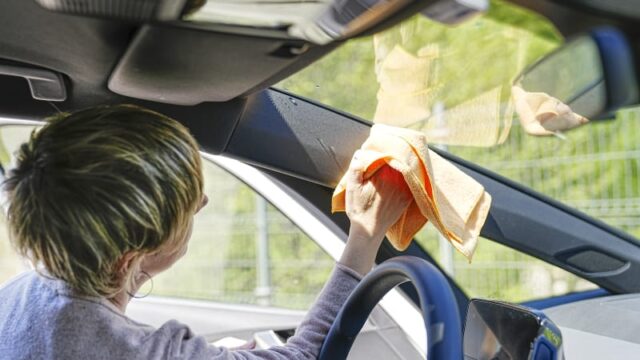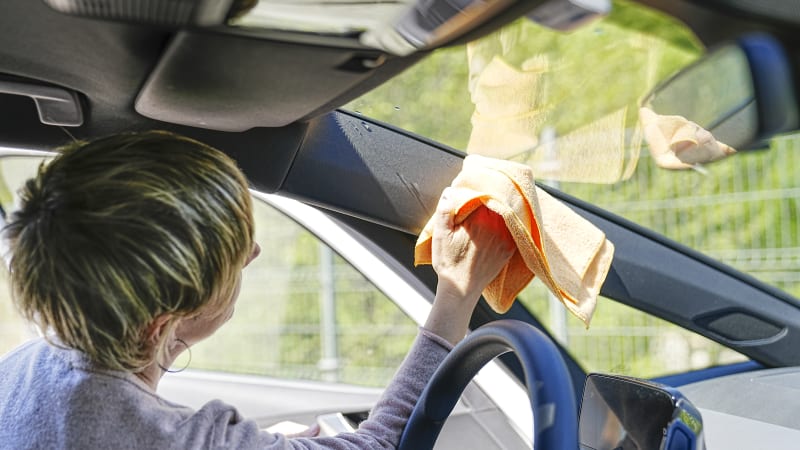There are a lot of issues you can ignore with your car’s condition and cleanliness, but a dirty windshield isn’t one of them. Day or night, a dirty windshield can make it hard to safely navigate the obstacles we face on a daily basis. And beyond safety, a cloudy view is just annoying. This guide will walk you through the basics of cleaning the inside of your windshield and give you a good idea of where to start if you’re unsure of the process.
Why the inside of your windshield gets so dirty
You might not be touching the inside of your car’s windshield regularly, but it keeps getting dirty. What gives? One of the first things to remember is that the new car smell and the air fresheners you love so much can “off-gas,” which means the materials contained within them release an odor and chemicals as they “settle in.” That off-gassing can leave a residue on your windshield that looks oily and cloudy, even if you haven’t touched the glass. Smoking, dust, pet dander, and road debris can also cloud the glass, making it way more difficult to see through.
Even if you don’t drive the car regularly, the off-gassing from the interior materials and other dirt inside the vehicle can cloud the windshield. I bought a 2024 Toyota GR Corolla several months before writing this article, and even though it only has 800 miles on the clock, I have to clean the interior surface of the windshield before driving it every time. Its inactivity and Maine’s warmer temperatures cause the “new” interior materials to off-gas and cloud the glass.
Cleaning the inside of your windshield
Before getting started, it’s important to make sure you have the right cleaners and materials to protect your vehicle’s interior. Lint-free or microfiber cloths are the best choice here, and it’s a good idea to avoid paper towels or other materials that can leave “fuzzies” or residue behind. Make sure you have a glass cleaner that is safe for your dash and interior finishes, as well as rubbing alcohol and distilled white vinegar.
You have a couple of options when deciding how to dilute the cleaners or mix your chemicals. The first is a 50/50 mix of rubbing alcohol and water with a teaspoon of white vinegar (vinegar does a great job cutting the oily residue). The other is a 70/15/15 mix of water, glass cleaner, and alcohol. No matter which solution you choose, it’s a good idea to place a towel on your dash to prevent unwanted drips or chemicals from running onto soft-touch materials.
Have all your materials in place before starting. Wipe the glass down with a clean microfiber cloth to start and then spray your mixture onto the rag. Using up-and-down movements, clean the glass from side to side, and ensure that the cleaner is cleared with each wipe to prevent streaks. And yes, of course it can be awkward to reach all areas of the windshield; you’ll have to contort a bit to do it. Once you’ve successfully cleaned the entire interior surface with your cloth, it’s helpful to go over the glass once more with a dry microfiber towel or cloth to remove any lint or remaining streaks.
Inside windshield cleaning best practices
Cleaning your windshield isn’t the most challenging DIY job you can do, but it does take some care to get right. Here are the best practices to follow:
- Clean your windshield last: Save the windshield for your final round of cleaning, as dirt and debris from other areas of your car can dirty your hard-fought streak-free glass. You’ll also want to avoid splashes from other parts of your car washing efforts.
- Make sure you’re using a clean cloth to avoid scratches or smearing other cleaning chemicals on your clean windshield. There’s nothing more frustrating than spending the time to clean a glass panel and then finding out that the towel is causing more harm than good.
- Try to pick cooler times of day to clean your car’s glass surfaces. Direct sunlight and warm weather can quickly dry the cleaner you’re using and make it difficult to get a streak-free result. But having some sunlight filter through and backlight the streaks and smudges can help you see them better..
If you’ve tried and tried to clean the inside of your windshield and have seen limited success, it might be time to seek professional help. In some cases, pitting and other damage can make the glass cloudy, and there is nothing a home cleaning job can do to improve the situation. If the detailer or shop can’t clean the glass, you might need a windshield replacement to remedy the issue, but check with your insurer first to explore any options you might have for a cost-free windshield replacement.
For more car-cleaning tips:
Be sure to check out our Autoblog Details series of videos. You’ll get dozens of great tips for making your car shine inside and out.
Here’s the episode on window cleaning:

































